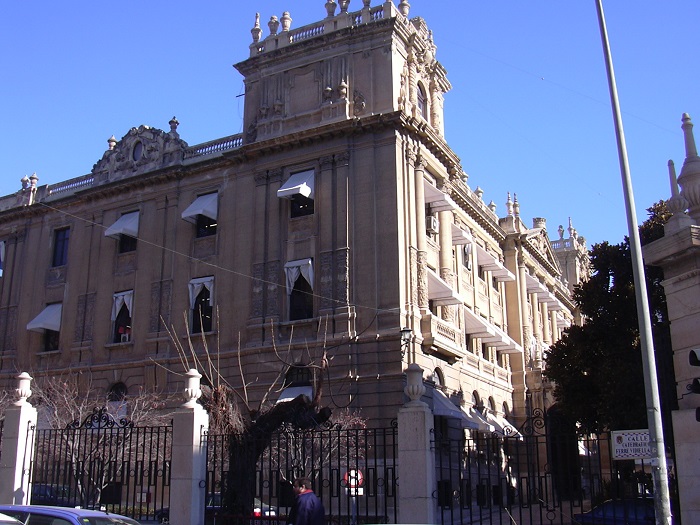Alicante approves 24 million euros in aid to those affected by COVID-19
The aid will help sectors such as hotels, bars and restaurants, and leisure, all of which have suffered greatly during the pandemic.

Thursday 18th February 2021 | XÀBIA AL DÍA
The Alicante Provincial Council has approved this Wednesday in an extraordinary plenary session, and with the support of all political groups, with the exception of Compromís who abstained, the credit modification that will allow to allocate, through two aid plans, 24 million of euros to the self-employed, SMEs and professionals in sectors such as hotels, restaurants or leisure with the aim of minimizing the economic impact of COVID-19.
During the plenary session, held electronically, the Deputy for Economic Development, Sebastián Cañadas, pointed out that “the situation arising from the health crisis has put our business fabric in extreme situations and therefore, from the Alicante Provincial Council, we have committed to putting all our work and effort at your service so that these aid reach those affected as soon as possible”.
Funds have also been set aside, from the remnants, to provide the aid plan for the self-employed, SMEs, micro-SMEs and professionals that the provincial institution already launched last year due to the pandemic and that this year is reactivated, raising its amount from six to nine million euros. This amount, which will be distributed according to population criteria among the 141 municipalities of the province, will allow the beneficiaries to meet the self-employed fees, the expenses of the alarm and security systems, the electricity and insurance bills, the rental of business or commercial vehicles or interest on loans, among others.
In this sense, Cañadas explained that this year new eligible concepts have been introduced, such as the self-employed quota or insurance premiums to facilitate the participation of potential beneficiaries in this own aid program, which will be managed through the town halls. Subsidies may reach 3,000 euros, compared to 2,000 euros last year.
The plenary session has also authorized an extraordinary credit of 14.7 million euros, an amount that the Alicante Provincial Council will allocate to the PLAN RESISTIR promoted by provincial institutions, city councils and the Generalitat Valenciana to help sectors such as the hospitality industry, leisure, culture or travel agencies, which are among the most affected by COVID-19 since their activity has been limited. The contribution of the provincial institution represents 22.5% of the subsidy that will fall on each beneficiary municipality which will have these funds at the end of next March.
The deputy for Infrastructure and spokesperson for Citizens (Cs), Javier Gutiérrez, has assessed, after the plenary session, the aid promoted by the Government team of the Provincial Council. “From the institutions we have to prevent thousands of businesses from closing down and with this objective we have made a great effort to raise a total of 23.7 million destined to help entrepreneurs, SMEs and the self-employed who are in a borderline situation after restrictions by the pandemic”, he highlighted. Likewise, he has announced that “our commitment to support the business fabric does not end here. It will continue as long as circumstances do not improve, encouraging initiatives from all areas of the province that give SMEs and the self-employed a break“.
The spokesman for the socialists, Toni Francés, has stated, in his speech, that “the provincial institution today approves two very important plans to support our productive fabric, absolutely necessary at a time as critical and complicated as the one we are experiencing“, although he lamented “the lack of agility and speed” in the transfer of provincial funds to municipalities, a criticism supported by Compromís spokesman Gerard Fullana.
In this regard, the person in charge of the Economic Development area has pointed out that “it is difficult to go faster” since “the administrative processing of this type of programs takes time and delays the arrival of aid, as the president of the Generalitat, Ximo Puig also admits”. However, he has indicated that the transfer of the Provincial Council will reach the town halls before the distribution of the aid begins among the beneficiaries of the respective municipal calls.
In addition, he recalled that the Generalitat Valenciana makes its payments through ‘confirming’ and not by nominative transfer as the provincial institution does, and that “this ‘confirming’ has not yet reached all municipalities, as is the case of Mutxamel“, municipality of which Cañadas is also mayor.
Finally, he regretted that from the Generalitat this year administrative obstacles are being placed on the aid program for the self-employed that is directly managed by the Alicante Provincial Council. In this sense, he explained that last year the General Directorate of Local Administration considered that the duplication report and the financial guardianship report were not necessary for the granting of these subsidies, since they understood that they were powers of the provincial institution. “However, coincidentally this year when making this same query, the answer has been that both procedures should be carried out, something that has surprised us“, added Cañadas, while the president of the Provincial Council, Carlos Mazón, has pointed out, in this regard , that “this report makes it clear who is wanting to hinder whom“.
The extraordinary session held on Wednesday morning, which began with a minute of silence in memory of the latest victims of gender violence, has been marked by the new Regulations of the corporation, which came into force recently and which sets and limits the times of intervention of the deputies in the exposition and debate of the points.
Click below to read the original story in Spanish on Xàbia AL DÍA





